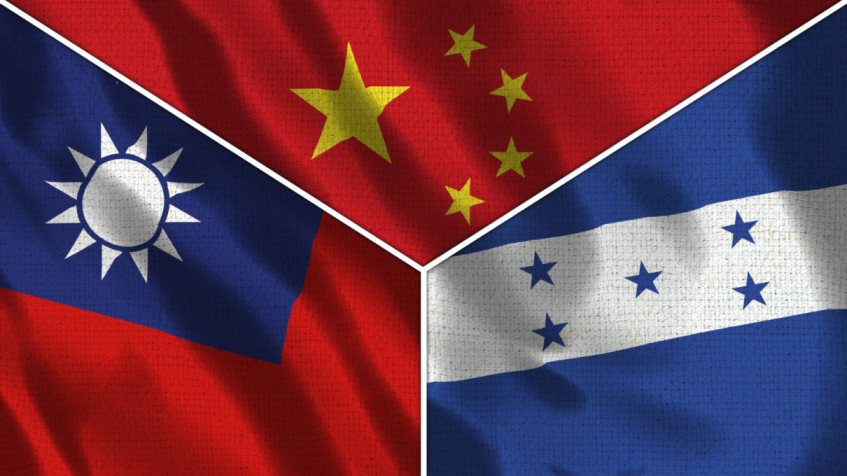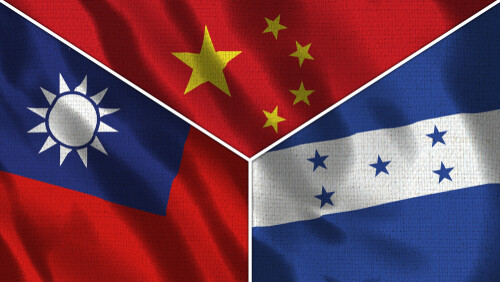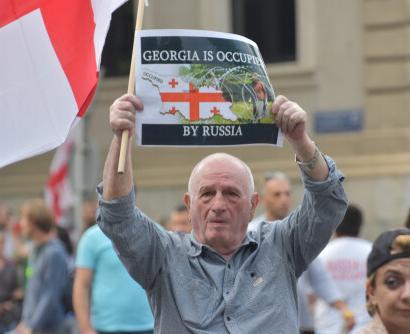Abstract: The 25th of March 2023 saw Honduras declare a formal end to its diplomatic relationship with Taiwan, before proceeding to establish official ties with the People’s Republic of China the following day. This said move was part of Honduran President Xiomara Castro’s pre-election campaign pledges. While international media outlets have covered Honduras’ arrangement, the decision per se does not exert a particularly significant impact on Taiwan’s status in the international arena. It does however, have the potential to generate subtle shifts inside Taiwan’s domestic society itself, especially given the upcoming 2024 Taiwanese presidential elections. Taiwan’s path ahead is rocky, as the incumbent Democratic Progressive Party seeks to defend the hotseat following the end of current Taiwanese President Tsai Ing-wen’s term.
Problem statement: How to fairly assess Honduras’ diplomatic U-Turn, and how could this event affect Taiwan’s political status and cross-strait relations?
Bottom-line-up-front: As a standalone occurrence, Honduras’ diplomatic reversal does not significantly impact Taiwan’s international standing and survival as an entity in and by itself. Still, it creates room within Taiwan’s domestic sphere for the Pan-Blue and Pan-Green coalition to spin political narratives leading into the 2024 presidential elections; that could change the course of cross-strait relations in the future.
So what?: The ripple effects of Honduras’ U-Turn should be heavily tempered and viewed within a vacuum that is separate from Taiwan’s survival as an entity in the international arena. Considering geopolitical developments and a global trend towards polarization, both the Democratic Progressive Party and the Kuomintang have the opportunity to gain a head-start by shaping the narrative in Taiwan’s domestic political discourse.

Source: shutterstock.com/motioncenter
The Honduras U-Turn
On March 25, 2023, Honduras announced the severance of its formal relationship with Taiwan while establishing official diplomatic ties with the PRC a day later.[1] This diplomatic reversal was in the making since January 01, 2023, when Honduran Foreign Minister Eduardo Enrique Reina met with China’s Foreign Affairs Vice Minister, Xie Feng, to discuss the construction of a hydraulic power plant.[2] Just a week after the meeting, the First Gentleman of Honduras, Manuel Zelaya, emphasized the necessity for Honduras to establish official bilateral relations with the PRC to resolve the its economic woes.[3] Honduras’ decision has been widely covered by international media outlets, with some scholars alluding to the significant impact caused by another loss of one of Taiwan’s few remaining diplomatic allies.[4] After the Honduras U-Turn, only 12 out of the 192 United Nations (UN) Member States continue to maintain official diplomatic ties with Taiwan, with the list mostly consisting of developing countries in Latin America and the Oceania region, alongside Eswatini (Africa), and the Holy See (Vatican City), which is a permanent observer state at the UN.
After the Honduras U-Turn, only 12 out of the 192 United Nations Member States continue to maintain official diplomatic ties with Taiwan.
Since the end of the Chinese Civil War in 1949, the PRC and Taiwan have been entangled in a longstanding tussle for diplomatic relations by offering economic benefits in the form of advantageous deals and monetary loans to other states in exchange for official diplomatic recognition – a process commonly known as dollar diplomacy. Honduran Foreign Minister Eduardo Enrique Reina also acknowledged that the U-Turn on Honduras’ end was, in part, driven by its economic struggles and the fact that Taiwan showed no willingness to provide the requisite economic aid package or to renegotiate its US$600 million debt.[5] Notably, the PRC has ramped up its investments in Honduras in the past few years, with a government-supported injection of around $300 million to finance the construction of Patuca III, a hydroelectric dam project in central Honduras. Honduras is also reported to be in negotiations with China regarding investments for Patuca II, a second dam forecasted to be built in eastern Honduras.[6]
The Significance Of Diplomatic Recognition
The significance of Taiwan’s loss of another diplomatic ally in Honduras represents an irreversible end to an 82-year-long diplomatic relationship built on mutual security concerns and a shared aversion to communism during the Cold War.[7] However, a closer look at the nature of Honduras’ diplomatic manoeuvre and Taiwan’s response reveals otherwise: that this move does not shift the needle significantly when it comes to Taiwan’s status in the international arena. Unpacking the Honduras U-Turn and an extrapolation of its effects reveals this very fact. In response to the incident, President Tsai’s choice of expression evoked considerable intrigue, as she characterized the end of Taiwan’s diplomatic relationship with Honduras as its refusal to be involved in a “meaningless contest of dollar diplomacy with China”.[8] Her strong-worded perspective on Honduras’ decision should be understood as a testament to Taiwan’s view of the tangible values of diplomatic recognition. Moreover, two separate interpretations can be extracted from her choice of semantics, in particular the word “meaningless”.
Firstly (and most evidently), Taiwan is cognizant that it cannot compete with the PRC on financial terms and that it would be virtually impossible for it to match the economic assistance packages offered by the PRC’s government. Case in point, former Taiwanese diplomatic allies like El Salvador, Kiribati, and Panama switched their diplomatic recognition to the PRC and received significant Chinese-backed investments shortly after their decisions.[9] President Tsai’s response can therefore be perceived as Taiwan’s unwillingness to continue fighting a losing battle for Honduras’ diplomatic recognition.
Taiwan is cognizant that it cannot compete with the PRC on financial terms and that it would be virtually impossible for it to match the economic assistance packages offered by the PRC’s government.
Secondly, President Tsai’s choice of the word “meaningless” can be viewed via the lens of pragmatism, an enduring feature in Taiwan’s foreign policy overtures since former President Lee Teng-hui introduced the concept of pragmatic diplomacy (also known as “wushi waijiao” in Chinese) in 1988. This concept was introduced to manage the challenges that Taiwan was facing in establishing foreign relations and has been credited as an important factor in leading to the 1992 Consensus,[10] the keystone meeting that created a diplomatic foundation for cross-strait relations to happen. Lee’s pragmatic diplomacy focused on tangible foreign policy gains for Taiwan. Still, Taiwan’s formal relationship with Honduras has generated limited gains for itself as it continues attempting to carve out diplomatic leeway to operate as a recognized entity in the international arena. In October 2022, ten of Taiwan’s then-14 diplomatic allies sent a letter of support for Taiwan’s inclusion in the UN,[11] but Taiwan continues to be excluded from UN affairs till today.
The “meaningless” label therefore has a twofold meaning. Here, that the foreign policy benefits Taiwan stands to gain from its relationship with Honduras are relatively insubstantial, and that Taiwan is acutely aware of this fact. Taiwan’s lack of diplomatic allies has not resulted in a noticeable decrease in support from the rest of the international community, as representatives from countries such as the United States (U.S.) and the Czech Republic[12] continue to engage in unofficial diplomatic relations with Taiwan.
Taiwan’s lack of diplomatic allies has not resulted in a noticeable decrease in support from the rest of the international community, as representatives from countries such as the United States and the Czech Republic continue to engage in unofficial diplomatic relations with Taiwan.
Taiwan’s continued existence despite its dearth of formal diplomatic allies thereafter leads to a critical point of consideration – how important is diplomatic recognition for Taiwan’s status in the global arena? Taiwan’s status in international affairs today remains a constant topic of discussion, but the murkiness of its official label as a “state” can only be better clarified using international law. The Montevideo Convention on the Rights and Duties of States is the core document that legal experts refer to when trying to classify Taiwan through the lens of foreign affairs. It delineates four conditions for an entity to be considered a state: a) a permanent population, b) a defined territory, c) government, and d) capacity to enter into relations with other states.[13]
At this point, Taiwan superficially meets the requirements for conditions a. to c. But the status gets tricky when assessing condition d, as the formality of its foreign policy relations with other states comes into question. Taiwan’s previously-unwavering attempts to garner support and official diplomatic recognition from other states should be understood as its attempt to satisfy all four conditions under customary international law for official statehood. This game of semantics has undoubtedly decreased in importance over the past few decades. It is evident that Taiwan has successfully carved out a space for itself in global affairs today despite being unable to woo other states into establishing official diplomatic ties. It continues to engage in unofficial relations with many countries worldwide and continues to field representation in international sporting events under the Chinese Taipei moniker. Taiwan’s athletes have excelled in fields such as baseball[14] and badminton,[15] helping to raise its profile across the global community. Even as tensions continue to flare up around Taiwan and East Asia,[16] it remains a popular tourist destination amidst the post-COVID travel boom, and its international profile continues to grow. After Honduras’ decision, Taiwan Foreign Minister Joseph Wu also responded to media queries by encouraging other states to pursue closer ties with Taiwan while also not explicitly ruling out the possibility of duality, which essentially involves a state officially recognizing both the PRC and Taiwan.[17] This concept of dual recognition is an irrefutable red line for the PRC, as it would represent a direct contravention of the one-China policy – any state that attempts dual recognition would certainly face a heavy-handed response from the PRC. It is virtually impossible for Taiwan to be unaware of this fact as well. Joseph Wu’s response to media queries can be understood via the lens of pragmatism, with Taiwan’s goal being to pursue closer ties with other states, regardless of the formality of the said relationships.
It would be overly dismissive to ignore the importance of diplomatic allies to Taiwan. However, the loss of diplomatic allies, as seen in the Honduras U-Turn, does not exert a sizeable impact on Taiwan’s international standing and survival as an entity in and by itself. The loss of diplomatic allies to the PRC does not equate to a depreciation in Taiwan’s value to the international community. Above all, Taiwan’s excellence in the semiconductor industry at this point presents the ultimate deterrence against any attempts to undermine its existence as an entity in international affairs today. Its sheer dominance, in part driven by the renowned Taiwan Semiconductor Manufacturing Company (TSMC), has held the world hostage to cross-strait political disputes thus far, with the potential to cripple key infrastructure and to inflict global economic damages worth hundreds of billions of dollars.[18] Taiwan is responsible for almost 90% of the global production of advanced semiconductor chips, and China continues to rely heavily on it for these advanced chips, which are critical components for important products such as phones, cameras and refrigerators.[19] At present, TSMC’s semiconductor industry should be viewed as Taiwan’s nuclear deterrence equivalent, and perhaps the largest limiting factor in China’s current strategic calculus when it comes to the (re)unification of Taiwan.
Taiwan’s excellence in the semiconductor industry at this point presents the ultimate deterrence against any attempts to undermine its existence as an entity in international affairs today.
Gaming The Narratives – Charting A Path Forward
The Honduras U-Turn has already elicited responses from the various states involved as they continue to jostle for a position atop the global game of narratives, where states involved in the Taiwan issue have attempted to shape proceedings in directions that are in line with their national interests. The U.S. sent a high-ranking diplomatic envoy to Honduras one week before the diplomatic move to salvage Honduras-Taiwan relations, although this was eventually fruitless.[20] U.S. Secretary of State Antony Blinken also stated that Taiwan still has a lot to offer to the world, and that each country has the right to make its own decisions.[21] The U.S. used the Honduras U-Turn to defend the Westphalian liberal paradigm and its underlying core principle – each state’s unequivocal right to sovereignty. On the other hand, China has responded to the Honduras U-Turn by re-emphasizing the sanctity of the One-China policy through its official media response.[22] Multiple state-linked media outlets have characterized Honduras’ decision as one that was in line with general trends (also known as “dashi suoqu” in Chinese). This four-word idiom in Chinese has been repeatedly observed in multiple press releases and media interviews. It can be understood as part of China’s attempts to push forth a narrative beneficial to pursuing its 2049 goal of national rejuvenation.
It is evident that both global superpowers are already engaged in the game of narratives as they continue to jump onto incidents like the Honduras U-Turn to shape international opinion in their respective favour(s). The Taiwan issue remains the largest looming threat over which both sides have direct cutting interests that they cannot afford to lose. This foreign policy behavior is largely in line with polarization trends and a U.S.- PRC relationship that has since moved away from mutual respect, and towards strategic contestation in plain and outright fashion. This, of course, follows issues such as the increased militarization around Taiwan and in the South China Sea, as well as the 2023 spy balloon incidents, with both superpowers adopting increasingly conflicting and confrontational stances across a large swathe of political and economic issues.
The Taiwan issue remains the largest looming threat over which both sides have direct cutting interests that they cannot afford to lose.
As for Taiwan, the Honduras U-Turn represents the ninth diplomatic ally it has lost since President Tsai took office in May 2016. President Tsai has defended the loss of Honduras by positing that the PRC’s suppression through diplomatic and military means cannot erode the Taiwanese people’s commitment to democracy or Taiwan’s efforts to engage in relations with the rest of the world.[23] A window of opportunity has emerged through this incident, as Taiwan’s two main political parties, the Democratic Progressive Party (DPP) and the Kuomintang (KMT) have an opportunity to take advantage of the Honduras U-Turn and create a political narrative leading into the 2024 Taiwanese presidential elections. Tsai’s incumbent DPP has already pursued a path of downplaying, where she has attempted to temper the loss of Honduras as a diplomatic ally by contending that it does not shift the status quo on cross-strait relations and that Taiwan will continue to defend its democratic values and its interactions with the rest of the world, official or otherwise. The KMT has used the opportunity to criticize Tsai for her wrong policies, with multiple party stalwarts expressing concern over Taiwan’s increased isolation in global affairs during the DPP’s reign.[24] As time inches closer to the end of Tsai’s reign as Taiwan’s Commander-in-Chief, both parties have started gaming the narratives in media circles, with Taiwan’s local media known for playing a role of outsized importance during the lead-up to every local or presidential election. This was seen in the 2019 Han Kuo-yu phenomenon,[25] where a populist Taiwanese politician rode on the media-generated waves and surged to victory in the Kaohsiung local elections before eventually contesting Tsai for presidency in 2020. The Honduras U-Turn has also signaled the official start to Taiwan’s election season. The results here could allow either party to gain a significant head-start in the game of narratives in Taiwanese local politics. The reality truly is that any discussion about Taiwan’s political scene cannot stand on firm analytical ground without including cross-strait relations in its overall calculus, which is why the loss of Honduras has the potential to play a game-changing role in the 2024 Taiwanese presidential elections.
The Honduras U-Turn has not exerted a significant impact when it comes to Taiwan’s status and existence in international affairs itself, but the incident presents a timely opportunity for the Pan-Blue and Pan-Green coalition to gain a headstart in the game of narratives early into election season, considering that local polls remain relatively divided between both camps. Drawing up a successful script using Honduras’ decision could help either side in spinning narratives that are inherently advantageous for the consolidation of their respective party positions when it comes to cross-strait relations.
The Honduras U-Turn has not exerted a significant impact when it comes to Taiwan’s status and existence in international affairs itself, but the incident presents a timely opportunity for the Pan-Blue and Pan-Green coalition to gain a headstart in the game of narratives early into election season.
While the KMT has gained significant political capital owing to the positive results of the 2022 Taiwan 9-in-1 local elections, the 2024 Taiwanese presidential elections are far from decided. The DPP has already nominated its preliminary 2024 candidate, William Lai, Taiwan’s current vice-president, which is a testament to its larger conformation to and continuation of the policies pursued during the Tsai administration, as he has constantly displayed a political stance that is largely aligned to Tsai Ing-wen herself.[26] While the KMT has yet to finalize its candidate, multiple names have emerged, including the hugely popular and long-serving New Taipei City mayor Hou Yu-ih, as well as the newly-elected Taipei mayor Chiang Wan-an, who is the great-grandson of former KMT stalwart Chiang Kai-shek. Things are heating up for cross-strait relations, and the Honduras U-Turn could become the hallmark event triggering an explosive start to Taiwan’s election season.
The next domino for Taiwan comes in the form of Paraguay, one of the remaining 13 states that continue to maintain official diplomatic relations with Taiwan. With its elections set for end-April 2023, Taiwan has risen to become one of the key topics of contention between Paraguay’s presidential candidates,[27] and a change in presidency could also spell the end of a second long-serving diplomatic relationship between Taiwan and another Latin American state in 2023. Taiwan’s 2024 election picture continues to remain murky, but as each year goes by, the 2049 PRC deadline looms on the horizon, with the future of cross-strait relations hanging in the balance.
Thomas Lim is a Senior Analyst enrolled in the Military Studies Programme of the S. Rajaratnam School of International Studies – a policy-oriented think tank from Singapore’s Nanyang Technological University. He is a keen observer of land warfare and vehicular capabilities in combat, with research interests that comprise armoured vehicle operations, maritime security, and foreign policy analysis. The views contained in this article are the author’s alone and do not represent those of Nanyang Technological University.
[1] Cindy Wang and Debby Wu, “Taiwan Loses Ally of Eight Decades as Honduras Recognizes China,” Bloomberg, March 26, 2023, https://www.bloomberg.com/news/articles/2023-03-26/taiwan-honduras-to-cut-diplomatic-ties-on-china-recognition.
[2] Joseph Yen, “Taiwan expresses ‘grave concern’ over Honduras-China envoy meeting,” Focus Taiwan, January 18, 2023, https://focustaiwan.tw/politics/202301180012.
[3] Editorial Desk, “Mel Zelaya says Honduras needs to establish bilateral relations with China,” Diaro Paradigma, January 08, 2023, https://paradigma.hn/mel-zelaya-asegura-que-honduras-necesita-establecer-relaciones-bilaterales-con-china/.
[4] Amy Chang Chien and Emiliano Rodriguez Mega, “In Blow to Taiwan, Honduras Switches Relations to China,” The New York Times, March 25, 2023, https://www.nytimes.com/2023/03/25/world/asia/taiwan-honduras-china-relations.html.
[5] Isabel Woodford, Gustavo Palencia, and Sarah Kinosian, “Debts and investment spur Honduran change of allegiance to China,” Reuters, March 16, 2023, https://www.reuters.com/world/honduras-decision-open-ties-with-china-about-pragmatism-not-ideology-minister-2023-03-15/.
[6] David Rogers, “Honduras switches to China in search of aid and infrastructure,” Global Construction Review, March 16, 2023, https://www.globalconstructionreview.com/honduras-switches-to-china-in-search-of-aid-and-infrastructure/.
[7] Julian Tucker and Larissa Stunkel, “Taiwan-Honduras Relations Hanging by a Thread,” Institute for Security and Development Policy, November 26, 2021, https://www.isdp.eu/taiwan-honduras-relations-hanging-by-a-thread/.
[8] Tsai Ing-wen, “Remarks on the termination of diplomatic relations with the Republic of Honduras,” Office of the President Republic of China (Taiwan), March 26, 2023, https://english.president.gov.tw/News/6464.
[9] Sonny Lo Shiu Hing, “OPINION – Taiwan’s Dollar Diplomacy and Its Implications,” Macau Business, October 01, 2022, https://www.macaubusiness.com/opinion-taiwans-dollar-diplomacy-and-its-implications/.
[10] Yang Yingchao, “Should Lee Teng-hui be ignored in “commemorating” the 30th anniversary of the 1992 Consensus?,” Lianhe Zaobao, July 26, 2022, https://www.zaobao.com.sg/wencui/political/story20220726-1296581.
[11] Naomi Hellman, “Diplomatic allies call on UN to include Taiwan,” Radio Taiwan International, October 05, 2002, https://en.rti.org.tw/news/view/id/2008321.
[12] Kelvin Chen, “Czech Republic will stand by Taiwan based on shared values,” Taiwan News, March 28, 2023, https://www.taiwannews.com.tw/en/news/4849106.
[13] League of Nations, “League of Nations Treaty Series,” United Nations, December 23, 1936, https://treaties.un.org/doc/Publication/UNTS/LON/Volume%20165/v165.pdf.
[14] Sean Scanlan, “Taiwan salutes slugger Yu Chang for WBC heroics,” Taiwan News, March 12, 2023, https://www.taiwannews.com.tw/en/news/4832494.
[15] Huang Chiao-wen, William Yen and Chao Yen-hsiang, “Taiwan’s top male, female shuttlers to play in BWF World Tour Finals,” Focus Taiwan, June 12, 2022, https://focustaiwan.tw/sports/202212060006.
[16] Craig Singleton, “How Nancy Pelosi’s Taiwan Gambit Backfired,” Foreign Policy, August 16, 2002, https://foreignpolicy.com/2022/08/16/taiwan-pelosi-china-military-conflict-east-asia-missiles/.
[17] CTS News, “Foreign policy moving towards “dual recognition”? Joseph Wu: Will not rule out the possibility,” CTS News, March 27, 2023, https://news.cts.com.tw/cts/politics/202303/202303272159093.html.
[18] Chris Miller, Chip War (New York: Scribner, 2022), 14.
[19] Saibal Dasgupta, “Race for Semiconductors Influences Taiwan Conflict,” Voice of America News, August 10, 2022, https://www.voanews.com/a/race-for-semiconductors-influences-taiwan-conflict-/6696432.html.
[20] Sarah Morland, “Senior U.S. envoy to travel to Honduras as it considers China ties,” Reuters, March 17, 2023, https://www.reuters.com/world/us/us-americas-envoy-travel-panama-honduras-coming-days-2023-03-16/
[21] U.S. Department of State, “Interview: Secretary Antony J. Blinken With Shaun Tandon of AFP,” Interview Transcript, March 17, 2023, https://www.state.gov/secretary-antony-j-blinken-with-shaun-tandon-of-afp/.
[22] Taiwan Affairs Office of China, “The establishment of diplomatic relations between Honduras and China is the correct choice following the general trend,” Interview Transcript, March 27, 2023, http://www.gov.cn/xinwen/2023-03/27/content_5748466.htm.
[23] Tsai Ing-wen, “Remarks on the termination of diplomatic relations with the Republic of Honduras,” Office of the President Republic of China (Taiwan), March 26, 2023, https://english.president.gov.tw/News/6464.
[24] Yeh Su-ping, Wang Cheng-chung, Chen Chun-hua and Evelyn Kao, “Ma Ying-jeou Foundation blames Tsai’s policy failures for Honduras loss,” Focus Taiwan, March 26, 2023, https://focustaiwan.tw/cross-strait/202303260014.
[25] Nick Aspinwall, “Taiwan Is Swept by the ‘Han Wave’,” The Diplomat, March 15, 2019, https://thediplomat.com/2019/03/taiwan-is-swept-by-the-han-wave/.
[26] Thompson Chau, “William Lai eyes Taiwan’s presidency as new leader of ruling DPP,” Nikkei Asia, January 18, 2023, https://asia.nikkei.com/Politics/William-Lai-eyes-Taiwan-s-presidency-as-new-leader-of-ruling-DPP.
[27] Julieta Heduvan and Juan Manuel Harán, “How Taiwan Become a Key Issue in Paraguay’s Presidential Election,” The Diplomat, March 11, 2023, https://thediplomat.com/2023/03/how-taiwan-become-a-key-issue-in-paraguays-presidential-election/.






